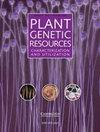Assessment of risk of GM contamination in flaxseed accessions imported from Canada: a case study to restrict the unauthorized GM events from entering India
IF 0.7
4区 生物学
Q3 PLANT SCIENCES
Plant Genetic Resources: Characterization and Utilization
Pub Date : 2022-05-31
DOI:10.1017/s1479262122000132
引用次数: 1
Abstract
In India, the restriction of genetically modified (GM) crops and derived products not approved in the country necessitates surveillance for transgene(s) in plant material/products imported into the country. CDC Triffid expressing acetolactate synthase (ALS) conferring tolerance to sulphonylurea herbicide is the only GM flax event that has got approval in Canada in 1990s and subsequently deregistered in 2001. In spite of deregistration, the unexpected and unauthorized detection of traces of GM flax in the consignments imported from Canada to Europe has further necessitated the stringent monitoring of flax shipments from Canada for suspected GM incidents. This study reports on the detection of transgenic elements being present in GM flax employing polymerase chain reaction assays, in a set of 123 flaxseed accessions imported from Canada for research purpose. Based on the tests conducted, none of the transgenic elements, namely, nos promoter (P-nos), nos terminator (T-nos), nptII marker gene, ALS transgene, as present in the GM flax CDC Triffid were detected in any of the tested accessions. The well-known herbicide tolerance gene cp4-epsps, being employed in Roundup® Ready events of other crops, was also not detected in these samples. This case study has demonstrated the importance of monitoring the presence of transgene(s) in flaxseed imports, and such studies need to be carried out for the imported seeds from the country where GM events of respective crop are being approved whereas they have not been approved in the country of import as a part of precautionary approach.评估从加拿大进口的亚麻籽中转基因污染的风险:一个限制未经授权的转基因事件进入印度的案例研究
在印度,限制在该国未经批准的转基因作物和衍生产品需要对进口到该国的植物材料/产品中的转基因进行监测。表达乙酰乳酸合成酶(ALS)的CDC Triffid对磺酰脲类除草剂具有耐受性,是唯一在20世纪90年代在加拿大获得批准的转基因亚麻事件,随后于2001年注销。尽管已撤销注册,但从加拿大输往欧洲的货物意外及未经授权检出含有基因改造亚麻的痕迹,进一步须要严格监察从加拿大输往欧洲的亚麻,以防发生怀疑基因改造事件。本研究报道了采用聚合酶链反应法对从加拿大进口的123份亚麻籽进行转基因成分的检测。结果表明,所有被试材料均未检测到转基因亚麻CDC Triffid中存在的启动子(P-nos)、终止子(T-nos)、nptII标记基因、ALS转基因等转基因元件。众所周知的抗除草剂基因cp4-epsps在其他作物抗农达事件中也没有被检测到。本案例研究证明了监测进口亚麻籽中转基因存在的重要性,并且需要对从各自作物转基因事件已获批准的国家进口的种子进行此类研究,而这些种子在进口国尚未获得批准,作为预防措施的一部分。
本文章由计算机程序翻译,如有差异,请以英文原文为准。
求助全文
约1分钟内获得全文
求助全文
来源期刊

Plant Genetic Resources: Characterization and Utilization
Agricultural and Biological Sciences-Agronomy and Crop Science
CiteScore
2.80
自引率
0.00%
发文量
29
审稿时长
>12 weeks
期刊介绍:
Plant Genetic Resources is an international journal which provides a forum for describing the application of novel genomic technologies, as well as their integration with established techniques, towards the understanding of the genetic variation captured in both in situ and ex situ collections of crop and non-crop plants; and for the airing of wider issues relevant to plant germplasm conservation and utilisation. We particularly welcome multi-disciplinary approaches that incorporate both a technical and a socio-economic focus. Technical aspects can cover developments in technologies of potential or demonstrated relevance to the analysis of variation and diversity at the phenotypic and genotypic levels.
 求助内容:
求助内容: 应助结果提醒方式:
应助结果提醒方式:


